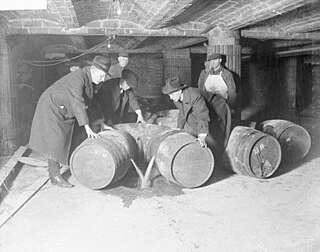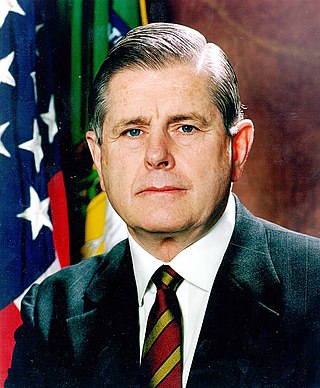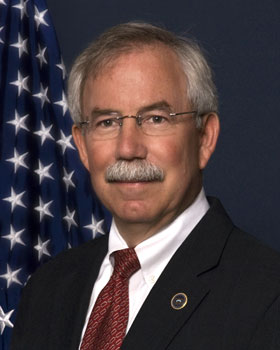Related Research Articles

The United States Department of Justice (DOJ), also known as the Justice Department, is a federal executive department of the United States government tasked with the enforcement of federal law and administration of justice in the United States. It is equivalent to the justice or interior ministries of other countries. The department is headed by the U.S. attorney general, who reports directly to the president of the United States and is a member of the president's Cabinet. The current attorney general is Merrick Garland, who was sworn in on March 11, 2021.

The Department of the Treasury (USDT) is the national treasury and finance department of the federal government of the United States, where it serves as an executive department. The department oversees the Bureau of Engraving and Printing and the U.S. Mint. These two agencies are responsible for printing all paper currency and coins, while the treasury executes its circulation in the domestic fiscal system. The USDT collects all federal taxes through the Internal Revenue Service; manages U.S. government debt instruments; licenses and supervises banks and thrift institutions; and advises the legislative and executive branches on matters of fiscal policy. The department is administered by the secretary of the treasury, who is a member of the Cabinet. The treasurer of the United States has limited statutory duties, but advises the Secretary on various matters such as coinage and currency production. Signatures of both officials appear on all Federal Reserve notes.

The National Firearms Act (NFA), 73rd Congress, Sess. 2, ch. 757, 48 Stat. 1236 was enacted on June 26, 1934, and currently codified and amended as I.R.C. ch. 53. The law is an Act of Congress in the United States that, in general, imposes an excise tax on the manufacture and transfer of certain firearms and mandates the registration of those firearms. The NFA is also referred to as Title II of the federal firearms laws, with the Gun Control Act of 1968 ("GCA") as Title I.

The Bureau of Alcohol, Tobacco, Firearms and Explosives (BATFE), commonly referred to as the ATF, is a domestic law enforcement agency within the United States Department of Justice. Its responsibilities include the investigation and prevention of federal offenses involving the unlawful use, manufacture, and possession of firearms and explosives; acts of arson and bombings; and illegal trafficking and tax evasion of alcohol and tobacco products. The ATF also regulates via licensing the sale, possession, and transportation of firearms, ammunition, and explosives in interstate commerce. Many of the ATF's activities are carried out in conjunction with task forces made up of state and local law enforcement officers, such as Project Safe Neighborhoods. The ATF operates a unique fire research laboratory in Beltsville, Maryland, where full-scale mock-ups of criminal arson can be reconstructed. The ATF had 5,285 employees and an annual budget of almost $1.5 billion in 2021. The ATF has received criticism over the Ruby Ridge controversy, the Waco siege controversy and others.

The Alcohol and Tobacco Tax and Trade Bureau, statutorily named the Tax and Trade Bureau and frequently shortened to TTB, is a bureau of the United States Department of the Treasury, which regulates and collects taxes on trade and imports of alcohol, tobacco, and firearms within the United States.
A special agent or federal agent is an investigator or detective for a governmental or independent agency, who primarily serves in criminal investigatory positions. Additionally, many federal and state special agents operate in "criminal intelligence" based roles as well. Within the U.S. federal law enforcement system, dozens of federal agencies employ federal law enforcement officers, each with different criteria pertaining to the use of the titles Special Agent and Agent.

In the United States, a gun show is an event where promoters generally rent large public venues and then rent tables for display areas for dealers of guns and related items, and charge admission for buyers. The majority of guns for sale at gun shows are modern sporting firearms. Approximately 5,000 gun shows occur annually in the United States.

The Bureau of Prohibition was the United States federal law enforcement agency formed to enforce the National Prohibition Act of 1919, commonly known as the Volstead Act, which enforced the 18th Amendment to the United States Constitution regarding the prohibition of the manufacture, sale, and transportation of alcoholic beverages. When it was first established in 1920, it was a unit of the Bureau of Internal Revenue. On April 1, 1927, it became an independent entity within the Department of the Treasury, changing its name from the Prohibition Unit to the Bureau of Prohibition. In 1930, it became part of the Department of Justice. By 1933, with the repeal of Prohibition imminent, it was briefly absorbed into the FBI, or "Bureau of Investigation" as it was then called, and became the Bureau's "Alcohol Beverage Unit," though, for practical purposes it continued to operate as a separate agency. Very shortly after that, once repeal became a reality, and the only federal laws regarding alcoholic beverages being their taxation, it was switched back to Treasury, where it was renamed the Alcohol Tax Unit.

The Federal Law Enforcement Training Centers (FLETC) serves as an interagency law enforcement training body for 105 United States government federal law enforcement agencies. The stated mission of FLETC is to "...train those who protect our homeland". It also provides training to state, local, campus, tribal, and international law enforcement agencies. Through the Rural Policing Institute (RPI) and the Office of State and Local Training, it provides tuition-free and low-cost training to state, local, campus and tribal law enforcement agencies.

John William Magaw is a former administrator for the United States Federal Government. He received a Bachelor of Science degree in education from Otterbein College, in Westerville, Ohio in 1957. He began his career in public service in 1959 as a state trooper with the Ohio State Highway Patrol.
Carl Joseph Truscott is a security expert and was the sixth Director of the Bureau of Alcohol, Tobacco, Firearms and Explosives in the United States Department of Justice under George W. Bush, a position he held from 2004 to 2006.

The Under Secretary for Terrorism and Financial Intelligence is a position within the United States Department of the Treasury responsible for directing the Treasury's efforts to cut the lines of financial support for terrorists, fight financial crime, enforce economic sanctions against rogue nations, and combat the financial support of the proliferation of weapons of mass destruction. The Under Secretary is appointed by the President and confirmed by the Senate.
The Youth Crime Gun Interdiction Initiative (YCGII) was led by the Bureau of Alcohol, Tobacco, Firearms and Explosives (ATF) during the late-1990s. The program aimed to increase firearm tracing of firearms recovered by law enforcement agencies, learn more about how juveniles and youth obtain firearms, and develop strategies to deal with problems involving illegally obtained firearms.
The federal government of the United States empowers a wide range of federal law enforcement agencies to maintain law and public order related to matters affecting the country as a whole.
Project Gunrunner is a project of the U.S. Bureau of Alcohol, Tobacco, Firearms and Explosives (ATF) intended to stem the flow of firearms into Mexico, in an attempt to deprive the Mexican drug cartels of weapons.
Rex Darwin Davis was an American law enforcement official who served as the first director of the Bureau of Alcohol, Tobacco, and Firearms, which later became known as the Bureau of Alcohol, Tobacco, Firearms and Explosives.
The U.S. Bomb Data Center serves as a nationwide collection center for information regarding arson and explosives related events throughout the United States. The Center was established in 1996 as a result of a congressional mandate and utilizes information from various government organizations such as the Bureau of Alcohol, Tobacco, Firearms and Explosives; the Federal Bureau of Investigation; and the United States Fire Administration.

Kenneth E. Melson is the former acting director of the Bureau of Alcohol, Tobacco, Firearms and Explosives (ATF) in the United States. He was appointed to this post by Attorney General Eric Holder in 2009. He resigned as head of the ATF in the aftermath of the ATF gunwalking scandal and was replaced by B. Todd Jones, a former Marine who has twice served as the U.S. attorney in Minnesota.

Regina Lombardo is an American law enforcement official previously serving as acting director of the Bureau of Alcohol, Tobacco, Firearms and Explosives.
References
- ↑ U.S Treasury Department Office of Public Affairs Photo-2899 Archived August 6, 2009, at the Wayback Machine
- ↑ U.S Treasury Department Office of Public Affairs, LS-297 Archived August 5, 2009, at the Wayback Machine
- ↑ PUBLIC LAW 107–296—NOV. 25, 2002, section 1111
- ↑ PUBLIC LAW 107–296—NOV. 25, 2002, section 1111 (c)(2)
- ↑ U.S Treasury Department Office of Public Affairs, KD-3793 Archived August 5, 2009, at the Wayback Machine